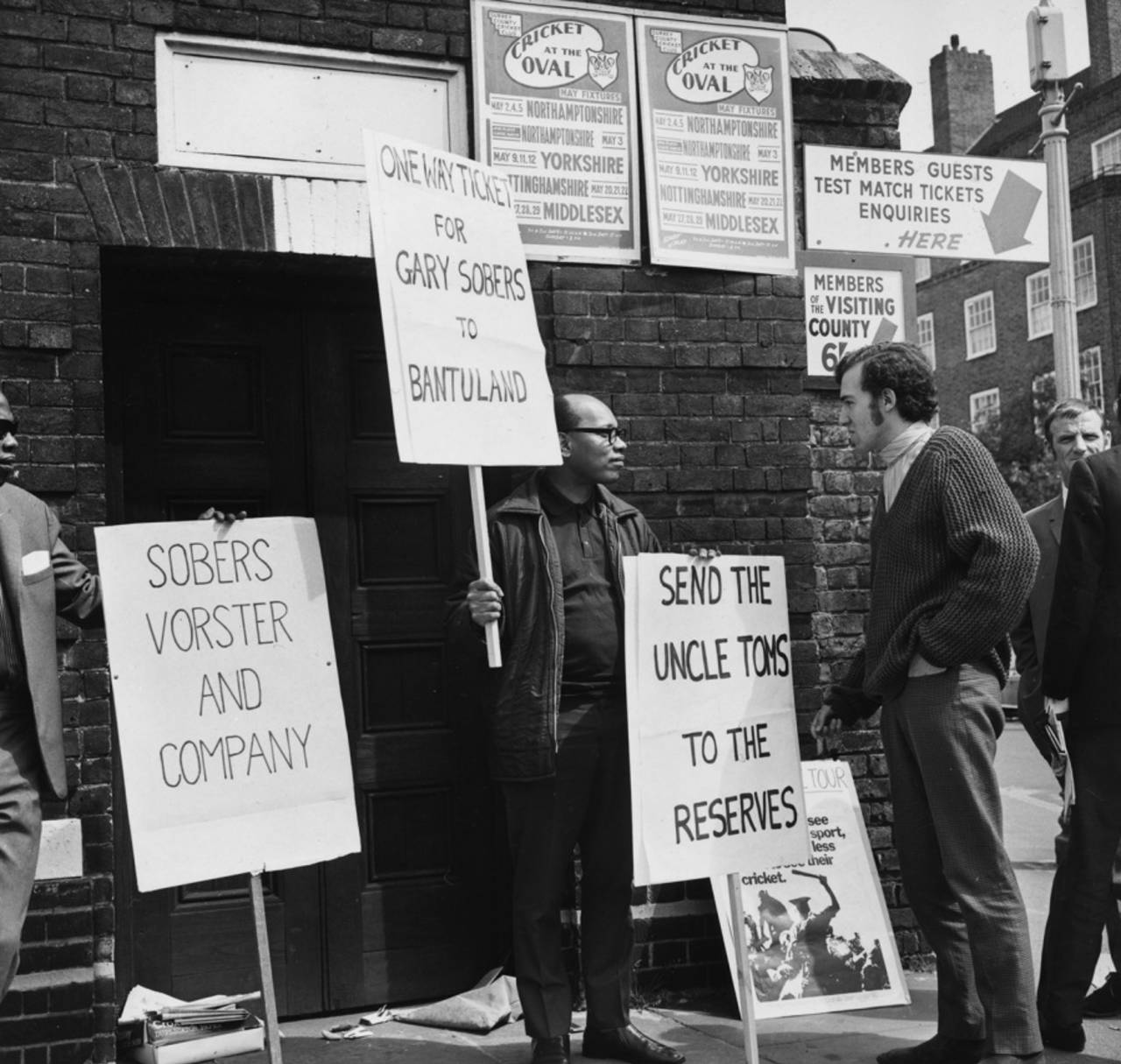It is often tempting to look around and conclude that we live in uniquely troubled times (and the effects of a global pandemic have certainly given 2020 a boot up the annus horribilis league table). But while the world has roiled these past few years amid schisms over race and culture, concerns about democratic accountability and the way governments function in an interconnected world, it is worth keeping in mind that the good old days often don't live up to their billing.
In
Barbed Wire and Cucumber Sandwiches, Colin Shindler revives the fractious arguments and bitter enmities that characterised a polarising
campaign to stop South Africa's 1970 tour of England. In doing so, he draws parallels with the 2016 European Union referendum - one of the side effects of which has been
the demise of the Kolpak era in county cricket - and reminds us how sport can play a central part in shaping our civilisation (even as sportsmen claim their perennial aversion to being lumped in with politicians).
If the past is another country, to borrow from the novelist LP Hartley (who finds his way into Shindler's account, along with many and varied other bits of correspondence dug out from the archives), the UK of half a century ago may not look so alien - particularly to a cricket fan. South Africa returned from sporting isolation in 1992, but cricket in the country to this day is still reckoning with a history blighted by apartheid.
Meanwhile, despite great strides in many areas, the experiences so eloquently given voice and amplified during an English summer touched by the Black Lives Matter protests around the world - from
Ebony Rainford-Brent and Michael Holding to
Azeem Rafiq and
Michael Carberry - remind us that questions of race and reconciliation are yet to be solved at home.
Even in the current climate, it is hard to imagine the deployment of barbed wire - as referenced in the book's title - searchlights and security guards at cricket grounds around the country simply in order to host a game. But that was merely one aspect of the planning (predicted cost: more than £250,000) for a proposed tour that pitted English cricket's hidebound establishment against a motley alliance of students, clergymen and MPs.
Trouble had been brewing since
the D'Oliveira affair of 1968, and South Africa's refusal to countenance the inclusion of a non-white player in the MCC touring party. Yet the authorities in England persisted in attempts to host South Africa less than two years later, in the belief that blandishments about "building bridges" and claims by the South African Cricket Association that future squads would be selected solely on merit might override objections about the iniquities of apartheid. As Shindler writes: "The bridges did not appear to be facilitating any sort of traffic into the townships."
The temptation of seeing England take on what was considered the best team in the world was obvious. South Africa had just thrashed Australia 4-0 at home, and could field a side containing Barry Richards, Graeme Pollock and Mike Procter, among others;
Basil D'Oliveira himself was in favour. But ranged against the blazers at Lord's was an equally compelling cast.
John Arlott had declined to tour South Africa again after observing the country's racial segregation in 1948-49, and he stepped down from BBC commentary duties ahead of the 1970 series out of opposition to the "completely evil regime" of the John Vorster government. The Reverend
David Sheppard, once of Sussex and England,
led opposition from the church, while the more militant Stop the Seventy Tour movement was orchestrated by future Labour MP Peter Hain. Learie Constantine, the former West Indies allrounder, then recently ennobled as Baron Constantine of Nelson, voiced fears that the arrival of South Africa "could be disastrous for race relations in this country".
Most colourful was the irascible commentary provided by the journalist and broadcaster Michael Parkinson, who railed against the "Marylebone Clodpole Club", whose refusal to bow in the face of public protest he characterised as follows: "It is a rag-bag of cliché, red herring, zig-zagging, bobbing and weaving, and as an argument in favour of the tour has all the watertight qualities of a string bag."
As well presenting a range of material from newspapers and magazines (in which, amusingly, some people were complaining about the "left-wing bias of the BBC" even 50 years ago), Shindler adroitly sifts the cultural milieu of the time, touching on anti-Vietnam war riots in America and the rise and fall of the Beatles, as well as connecting events to the present day: "The fault line running through the country that divided Leavers and Remainers in Britain after June 2016 is not far removed from the line that divided those who supported the tour from those who exulted in its cancellation in 1970."
The fight to stop the '70 tour during a summer when cricket grounds became battlegrounds remains an important episode in the history of the game in both England and South Africa, for whom years of isolation were to follow. Shindler's book, as Parkinson writes in the foreword, is a "powerful reminder of those turbulent times", as well as of cricket's capacity to promote change. In another divided era, the struggle for a better world beyond the boundary continues.
Barbed Wire and Cucumber Sandwiches
by Colin Shindler
Pitch Publishing 2020
£19.99, 320 pages

